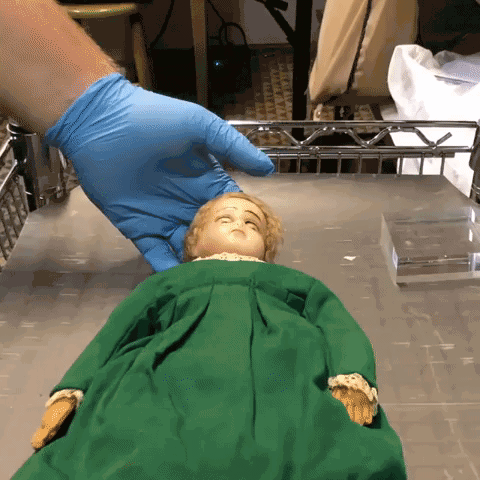A Minnesota Museum’s Creepy Doll Contest Is Here to Haunt Your Dreams
“The doll I disdain handling is the one with human hair,” says curator Dan Nowakowski
:focal(660x323:661x324)/https://tf-cmsv2-smithsonianmag-media.s3.amazonaws.com/filer/2f/9c/2f9ce2a8-6a6d-4ec5-b8bb-b368c95899ca/72057975_10156954408124263_7043718113145126912_o.jpg)
Ghosts, ghouls, vampires and monsters might scare us with their fangs and snarls, but is there anything that surpasses the subtle terror and shiver-inducing frightfulness of a creepy doll? In honor of Halloween, the brave souls at the History Center of Olmsted County in Rochester, Minnesota, dug into the museum’s collection of antique dolls, featuring nine of the most unsettling ones in a “Creepy Doll Contest.” Now, the winner of the competition is here to haunt your dreams.
The History Center began posting photographs of its eeriest dolls on Facebook and Instagram around mid-October. Members of the public were asked to vote by “liking” their favorite (or perhaps least favorite), from a doll stuffed into a pink, frilly dress—its hair reduced to shaggy patches and the irises of its eyes completely gone—to a figurine of a child with huge, blurry eyes and a grimacing mouth. A doll whose icy blue eyes snap open when lifted offered a particularly bone-chilling sight.

“The doll I disdain handling is the one with human hair,” Dan Nowakowski, a curator at the history center, tells Minnesota Public Radio’s Catharine Richert.
Ultimately, a 169-year-old cloth doll was deemed the creepiest in all the land. Originally handmade and, according to Nowakowski, “painted with a facial tone color,” the toy’s paint faded over the years, and somewhere along the line, it lost one of its arms. Now, the doll looks like a mummified child stuffed into a pink floral dress. The crown museum staff bestowed to celebrate its win really didn't help.
Though they’re the stuff of nightmares today, the dolls’ makers didn’t intend for their creations to be creepy. Many are more than 100 years old, Nowakowski tells CNN’s Leah Asmelash, and few were carefully preserved before entering the History Center’s collections. Years of handling by little ones took their toll, causing paint to disappear and limbs to be lost.
To modern viewers, this decay may trigger an intriguing sensation known as the “uncanny valley.” While scientists are still working to understand the phenomenon, the basic gist is that humans react well to human-like figures, but only up to a point. If the figures start looking too human but don’t quite hit the mark, viewers get creeped out—think of humanesque robots that blink weirdly or display choppy movements.
Dolls entered uncanny valley territory during the 18th and 19th centuries, when manufacturers began developing materials and methods to make the toys look more life-like, Linda Rodriguez McRobbie reported for Smithsonian.com in 2015. The figurines’ creep factor spikes when they start to wear down in ways that further muddle the lines between human and inhuman.
“The dolls don’t age well,” toy expert Ken Hoyt explained to Rodriguez McRobbie. “ … I think any time that a doll really tried to look like a human being and now is 100 years old, the hair is decaying, the eyes don’t work anymore.”
Hoyt added, “So it looks as much like a baby as possible, but like an ancient baby.”
Yet the strange thing about creepiness—and fear in general—is that we sometimes enjoy it. Although the History Center had planned on displaying the winning doll and runner-up (the terrifying blinker) for Halloween, the contest proved so popular on social media that staff decided to display all nine dolls, plus another 15 from the museum’s collection, through December 1. So, if you happen to be in the Rochester area, there’s plenty of time to shudder your way through the exhibition—if you dare.
/https://tf-cmsv2-smithsonianmag-media.s3.amazonaws.com/filer/2a/f2/2af25957-93c1-4061-8925-8fe8fbfa6082/72574596_10156954362574263_6230935804810625024_o.jpg)
/https://tf-cmsv2-smithsonianmag-media.s3.amazonaws.com/filer/85/3d/853d4f86-b0d1-438b-af3d-c761539d3db9/73250682_10156992933194263_473815462040305664_o.jpg)
/https://tf-cmsv2-smithsonianmag-media.s3.amazonaws.com/filer/92/f1/92f13eb1-c288-4db8-91d7-a13e6d38853f/72307565_10156954370704263_663913033843605504_o.jpg)